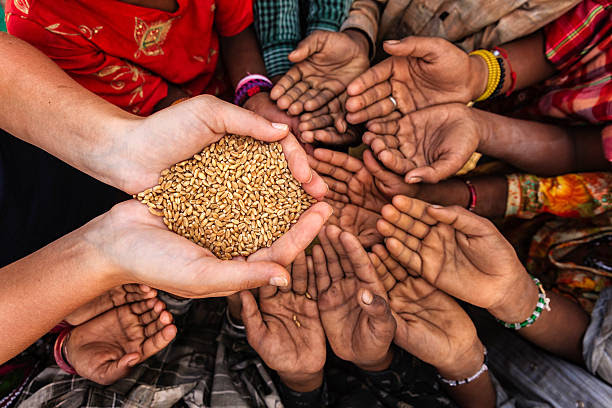World Hunger Can Be Solved If We Take Action To Transform Our Food System – WFP
World Food Programme (WFP) has said beyond the conflict and other causes, world hunger should be taken as a shared responsibility requiring global attention in both developed and developing nations.

The World Food Programme (WFP) says world hunger is a shared responsibility which can only be solved if food can be seen as a fundamental human right and not a commodity.
According to the humanitarian organisation, “the world needs to change the way the world thinks of food – not as a commodity, but as a fundamental human right.”
Elizabeth Nyamayaro, WFP Special Advisor, reflects on the relationship between food systems and hunger.
“To end hunger, we need to stop considering it someone else’s problem: this is a shared responsibility requiring global attention in both developed and developing nations,” she stated on the day of the UN Food Systems Summit.
The WFP Special Advisor referred back to when she was eight years old, and a severe drought devastated her small village in Zimbabwe.
She further narrated how she almost died due to hunger but survived after a fellow African, who worked for the United Nations, found her and offered her a bowl of porridge, saving her.
Several decades later, she said, the world still fights hunger, “the very same issue that almost took my life, remains rampant”.
The Humanitarian Advisor revealed that during her childhood in the early 80s, famine was primarily perceived as an ‘African problem’.
“Today, hunger and malnutrition continue to disproportionately impact the African continent as well as developing countries that bear the brunt of the effects of climate change,” she said.
Even as the world grows enough food to feed, “one in nine people still goes to bed hungry every night, and malnutrition remains the leading cause of death and illness globally.”
According to her, droughts and other extreme weather events such as floods, storms and heatwaves, have threatened lives and livelihoods. And the countries most affected are the ones that contribute the least towards the greenhouse emissions that cause them.
Also, she stated that one third of the food produced for human consumption is either lost due to poor storage or wasted at the consumer end in rich countries.
“Food wastage is the third-largest producer of carbon dioxide in the world after the USA and China, further increasing the effects of climate change on communities in the developing world.”
However, she stated that the United Nations is convening the first ever Food Systems Summit in New York City as part of the Decade of Action to achieve the Sustainable Development Goals (SDGs).
The Summit, according to her, will launch bold new actions to deliver progress on all 17 SDGs, each of which relies to some degree on healthier, more sustainable and equitable food systems.
“This is particularly relevant for SDG2, which aims to reach a zero-hunger world and put an end to malnutrition. To get there, we need collective action to transform our food systems, that is the complex set of actors and processes that ensure food reaches our tables.”
She added that the equation is simple, “if we are all part of creating the problem in the first place, then we must all be part of the solution.”
“Now more than ever, we are seeing that our individual actions and behaviors can indeed impact the lives of others in different parts of the world,” she concluded.
Support Our Journalism
There are millions of ordinary people affected by conflict in Africa whose stories are missing in the mainstream media. HumAngle is determined to tell those challenging and under-reported stories, hoping that the people impacted by these conflicts will find the safety and security they deserve.
To ensure that we continue to provide public service coverage, we have a small favour to ask you. We want you to be part of our journalistic endeavour by contributing a token to us.
Your donation will further promote a robust, free, and independent media.
Donate HereStay Closer To The Stories That Matter




